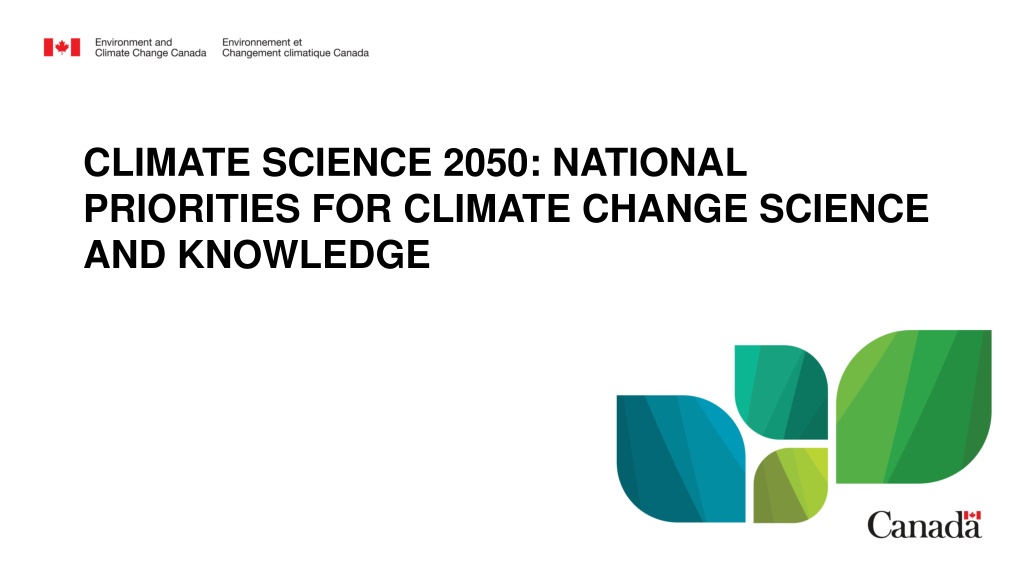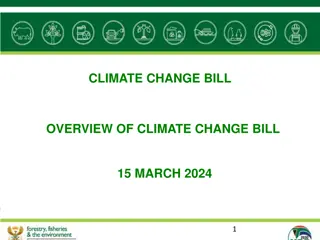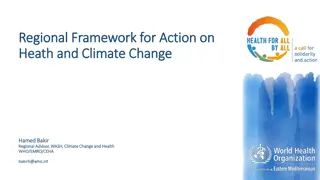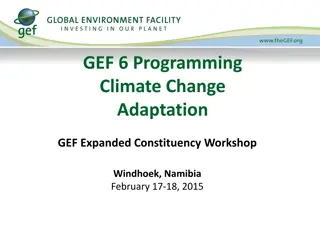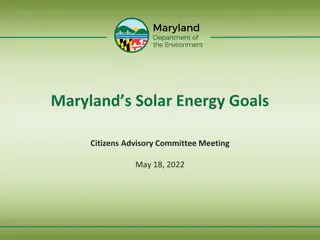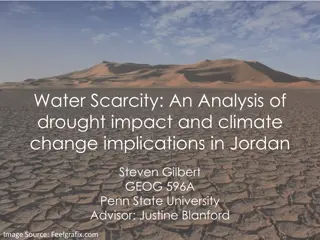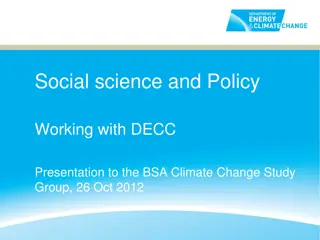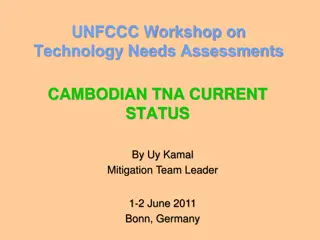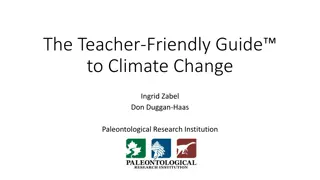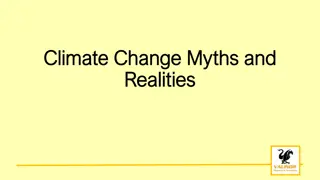National Priorities for Climate Change Science and Knowledge in Canada
Canadians are experiencing firsthand the impacts of climate change, including wildfires, heatwaves, floods, hurricanes, and droughts. To address these challenges, foundational climate change science and knowledge are essential for understanding our changing environment, identifying impacts, making informed decisions, taking action to keep Canadians safe, and monitoring progress. The Climate Science 2050 initiative by the Government of Canada aims to advance science and knowledge on climate change and prioritize critical research activities to mitigate the impacts of climate change. Through extensive engagement with experts, organizations, and stakeholders, key scientific research areas have been identified to guide future research and decision-making processes.
Download Presentation

Please find below an Image/Link to download the presentation.
The content on the website is provided AS IS for your information and personal use only. It may not be sold, licensed, or shared on other websites without obtaining consent from the author. Download presentation by click this link. If you encounter any issues during the download, it is possible that the publisher has removed the file from their server.
E N D
Presentation Transcript
CLIMATE SCIENCE 2050: NATIONAL PRIORITIES FOR CLIMATE CHANGE SCIENCE AND KNOWLEDGE
CONTEXT Canadians are experiencing first-hand the impacts of climate change, through devastating wildfires, heatwaves, floods, hurricanes, and droughts o Frequency and magnitude are expected to increase significantly if GHG emissions are not reduced and the climate continues to warm Foundational climate change science and knowledge is essential to: o Understand our changing environment o Identify current and future impacts o Make informed decisions o Take action to keep Canadians safe o Monitor progress 2
BACKGROUND In December 2020, GoC published Climate Science 2050: Advancing Science and Knowledge on Climate Change o A first-ever national synthesis to better understand the breadth of climate change science and knowledge needs A vast number of science gaps and needs were identified Given the urgency of addressing climate impacts and time, capacity and resource limits a second report was developed to prioritize the most critical science within various domains Climate Science 2050: National Priorities for Climate Change Science and Knowledge (to be released in June 2024) 3
DEVELOPING THE REPORT From 2021-22, ECCC led extensive engagement to bring together multiple expert views on key scientific research activities in different domains Including input from 7 expert roundtables co-led with various departments by themes More than 500 climate program leaders and experts across governments, academia and National Indigenous Organizations Engagement with 500+ Climate Leaders National Priorities for Climate Change Science and Knowledge Report Consensus with OGDs Peer Review Priorities were reviewed and confirmed by OGDs who were also implicated Identification of science priorities across disciplines and OGDs 10 climate experts (external) reviewed and confirmed priorities Academia, NGOs, NIOs to use report to guide future research and work OGDs/Agencies to use report to set priorities internally and forward planning 4
OVERVIEW OF THE REPORT Supporting a strong Canadian economy Identifies priority action areas where climate change science nationally should focus for next 5-10 years Indigenous science and knowledge Recognizes Canada s climate change science capacity is distributed across academia, governments, the private sector, NGOs and Indigenous organizations Resilient communities and built environments Climate Change Science and Knowledge Health and security of Canadians Identifies need for better national coordination of climate change science research and knowledge Getting to net- zero GHG emissions Protecting nature and ecosystems 5
PRIORITY SCIENCE AREAS & EXAMPLES Supporting a strong Canadian economy Develop and track indicators of social-ecological resilience in natural resource sectors and communities Build knowledge from social sciences and behavioural economics to inform decision-making and communication strategies specific to each sector Examine the relationships among climate change, climate action, and sustainable development Resilient net-zero communities and built environments Generate climate data, predictions, and projections to inform risk assessment, adaptation, and actions to reduce GHG emissions from the built environment Improve climate information and predictions and projections of extremes Understand future water sustainability, including supply, demand, quality, and effects on human and ecosystem health 6
PRIORITY SCIENCE AREAS & EXAMPLES (CONT.) Getting to net-zero GHG emissions Improve GHG reporting by improving collection and monitoring of emissions and activity data and by reconciling complementary techniques for estimating emissions Develop integrated atmospheric GHG monitoring systems Understand socio-political, attitudinal, and behavioural processes in net-zero pathways and improve how these are integrated in modelling and analysis Health and security of Canadians Understanding the impacts of climate change on health and health systems, to advance effective, equitable, and feasible measures for health adaptation Strengthen understanding of risks and drivers of change across the human, animal, plant, and environment interfaces Study the risks and threat-multipliers of climate change for the operations of security institutions and for emergency preparedness 7
PRIORITY SCIENCE AREAS & EXAMPLES (CONT.) Protecting nature and ecosystems Better understand key ecosystem attributes, climate drivers, and responses influencing ecosystem and biodiversity resilience and change Monitor carbon stocks to understand their responses to changing climate conditions and disturbances Advance Earth system modelling to better represent processes in northern regions Indigenous science and knowledge Develop Indigenous leadership in climate change science and science networks Support science and knowledge clusters and networks that actively build relationships with Indigenous Peoples in creating pathways that respect local grassroots climate science concerns and priorities Braid and weave science planning and implementation with Indigenous governments, organizations, and citizens to craft approaches that are relevant to regions, based on distinctions, and uphold Indigenous rights and self- determination 8
NEED FOR COLLABORATIVE EFFORTS Implementation of science priorities will be more effective and successful if accompanied with integrated, horizontal efforts Academia, governments, the private sector, NGOs and Indigenous organizations all have a part to play in advancing climate change science Federal leadership required for advancing key elements of the report ECCC and federal partners will have a key role to play, not only conducting climate change science, but acting as a convener Federal climate change science coordination supports: Effective delivery and investment in GoC policies and programs Development of collaborative research partnerships across government, academia and the granting councils Policy and regulatory sector targeted climate science (e.g., oil and gas, health, forestry, agriculture, fisheries) Cross-cutting environmental science for freshwater, biodiversity and sustainable development 9
